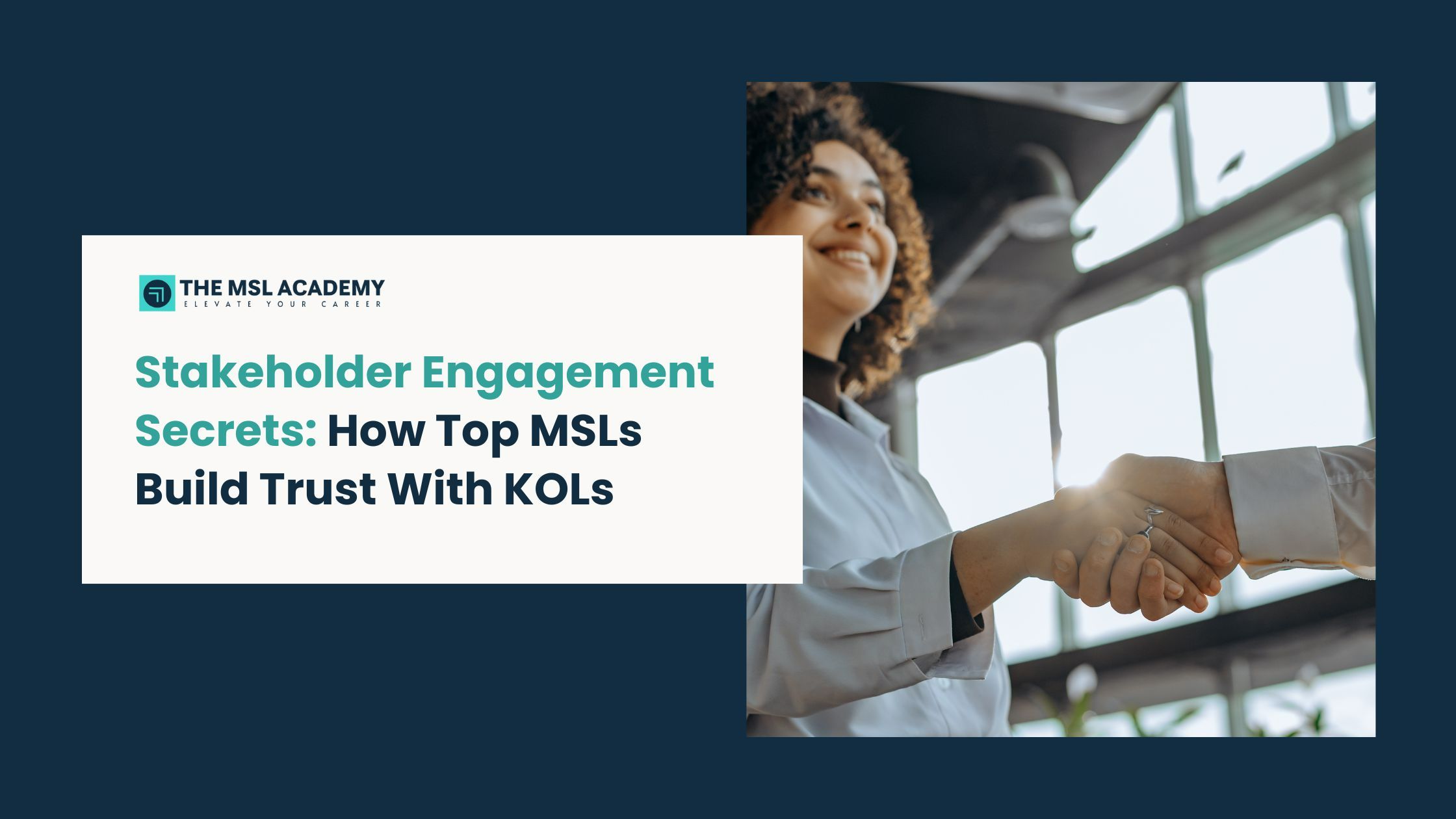Stakeholder Engagement Secrets: How Top MSLs Build Trust With KOLs
May 09, 2025
MSLs serve as the scientific bridge between pharma companies and the medical community. Central to this role is stakeholder engagement—building trust, credibility, and ongoing scientific exchange with KOLs. But how exactly do successful MSLs cultivate these relationships? It’s not just about scheduled meetings; it’s about consistent, meaningful touchpoints that provide value. Let’s explore what sets exceptional MSLs apart when it comes to external engagement.
Strong stakeholder engagement is the foundation upon which effective medical strategy is built. The most impactful MSLs see KOL relationships not as transactions, but as partnerships built on mutual curiosity and shared purpose.
Understand Before You Engage
The first step in stakeholder engagement is listening. Great MSLs take time to understand a KOL’s research interests, clinical focus, and challenges. This shows respect and allows the MSL to tailor insights, not just deliver a slide deck. Learn their preferred communication style—some prefer in-person meetings, while others prefer email follow-ups. Track their publications and clinical trials to remain informed.
Empathy and curiosity go a long way in building rapport. Review their academic background or social media presence for clues about their passions. Building a KOL profile before outreach helps you engage with relevance and confidence. This preparation not only demonstrates professionalism but also saves both parties time by focusing the conversation on shared priorities. You might even uncover personal interests—like health equity or digital health—that can shape future discussions.
Effective engagement starts with intention. By doing your homework ahead of time, you lay the groundwork for authentic scientific exchange.
Be a Scientific Resource, Not a Salesperson
MSLs are valued for their non-promotional, unbiased expertise. Establish your identity as a peer and educator. Share peer-reviewed data, clinical practice guidelines, or relevant congress abstracts. Avoid the temptation to "sell"—your credibility is your currency. Let KOLs lead the conversation and explore topics that matter to their patients.
When you're seen as a reliable partner, doors to deeper scientific exchange open naturally. Sometimes the best support is being a sounding board for clinical insights.
KOLs are often juggling multiple responsibilities, so coming in with clarity and objectivity can be a breath of fresh air. MSLs should maintain transparency about what they can and cannot discuss, especially in pre-launch settings.
Never underestimate the value of saying, “Let me get back to you with a more detailed answer.” It reinforces that you’re committed to accuracy, not just face time.
Your goal is to build a reputation as someone who adds clarity, not clutter, to scientific dialogue.
Pre-Call Planning: The Key to Relevance
Before engaging a KOL, prepare by reviewing their publications, congress involvement, or clinical trial participation. Develop probing, open-ended questions that spark discussion:
"How have you seen [disease area] management evolve in your practice?"
"What are your thoughts on the recent data from [trial]?"
Prepare for objections or data challenges, and think critically about how your product fits into their practice. A little preparation goes a long way in building respect and credibility.
Tailor your questions to each KOL’s specialty or region. Align your engagement goals with broader medical strategies.
Try framing your questions around impact—“What changes have you noticed in patient outcomes since…”—to invite richer discussion. Anticipate potential data controversies and practice neutral, evidence-based responses. Preparation gives you flexibility and confidence in any conversation.
When you plan with the KOL’s goals in mind, the interaction becomes a two-way value exchange, not a monologue.
Delivering Value in Every Interaction
Value can come in many forms:
- Providing data tailored to patient subpopulations
- Offering to connect KOLs with colleagues for collaborative studies
- Summarizing recent congress takeaways they may have missed
- Tailor value delivery based on your KOL's career stage—early-career physicians may appreciate mentorship opportunities, while seasoned experts might seek advisory board invitations.
Even a timely reminder about an upcoming conference can position you as helpful. Offer support for educational initiatives or access to clinical trial opportunities. Keep your interactions flexible—sometimes a brief check-in call is all that’s needed to maintain momentum.
Consider asking, “What gaps do you see in current treatment approaches?” to guide future support.
When you provide relevant, actionable insights, your presence becomes something KOLs genuinely look forward to.
Top MSLs personalize every interaction, focusing on what matters most to the KOL in that moment.
Follow-Up Matters
Engagement doesn’t end with a meeting. Send follow-up emails summarizing key takeaways or sharing additional data. This builds continuity and trust.
Consider adding personalized touches like linking a newly published study they might find interesting. Keep your tone professional yet warm—you're nurturing a professional relationship over time.
If a KOL shares a clinical challenge, follow up with resources that address it. Thoughtful follow-up builds your brand as a trusted partner, not just a one-time visitor.
The speed and relevance of your follow-up can often be the difference between a forgotten visit and a lasting impression.
Use a consistent cadence of updates to keep the dialogue alive—without overwhelming your stakeholder.
Measure Success Through Insight, Not Access
Rather than focusing solely on frequency of interactions, assess the depth of scientific conversations and the quality of insights gathered. These insights often influence internal strategy and should be well-documented.
Share relevant summaries with cross-functional teams, showcasing how KOL feedback can shape product messaging or study designs. A single impactful insight can be more valuable than a dozen shallow touchpoints. Consider building a dashboard or tracker to visualize engagement trends.
Quality over quantity ensures your time—and the KOL’s—is well spent.
Ask yourself, “What did I learn from this interaction that our team didn’t know before?” That’s the true measure of value.
Strategic documentation also helps prioritize follow-up and strengthens your contributions in medical planning meetings.
Building Long-Term Relationships
Trust doesn’t happen overnight. Top MSLs invest time and consistency in their engagements. They follow up months later on a topic of mutual interest or circle back with updated data.
Think of KOLs as collaborators in a scientific mission, not one-off interactions. Relationships are sustained through mutual respect, shared goals, and open communication.
Track anniversaries or professional milestones—it shows attention to detail and personal investment.
Stay in touch even when you don’t have new data to share—a simple congratulations on a publication can go a long way.
When MSLs show up consistently and thoughtfully, they become part of the KOL’s inner circle of trusted peers. Your follow-through defines your reputation more than your initial pitch ever will.
Handling Difficult Conversations
Not all interactions are easy. A KOL might challenge data or disagree with company positioning. Great MSLs remain composed, acknowledge the concern, and provide context rather than defensiveness.
It’s okay to say, “That’s a great point. Let me take that back to our team.” This demonstrates humility and professionalism.
Over time, even skeptical KOLs may grow to respect your authenticity.
Approach disagreements as opportunities to listen and learn—sometimes the pushback reveals important unmet needs.
Confidence, not combativeness, builds credibility in the long run.
Conclusion
Top MSLs know that trust is earned through consistency, knowledge, and authenticity. Stakeholder engagement isn’t just a checkbox—it’s a long-term relationship that grows with each meaningful, scientific exchange. In an era where personalized communication matters more than ever, MSLs must approach each KOL as a unique partner.
The best engagement is not just heard—it’s remembered.
By blending empathy, preparation, and science, MSLs can cultivate partnerships that benefit both medicine and patients.
Your ability to connect the dots between KOL needs and organizational goals is what elevates you from a visitor to a valued partner.
The true power of stakeholder engagement lies in building something bigger than yourself—a shared commitment to advancing healthcare.



